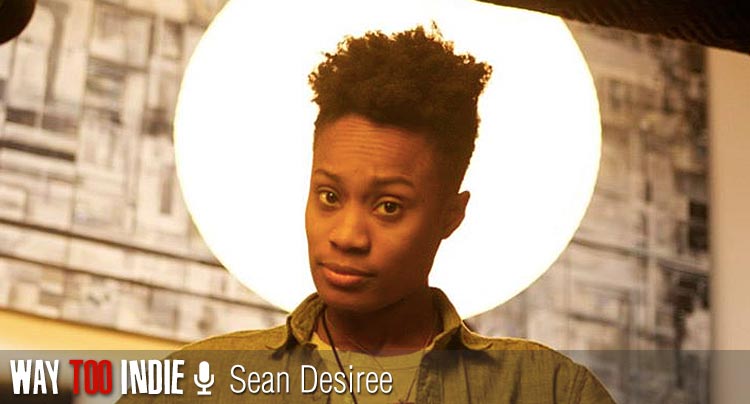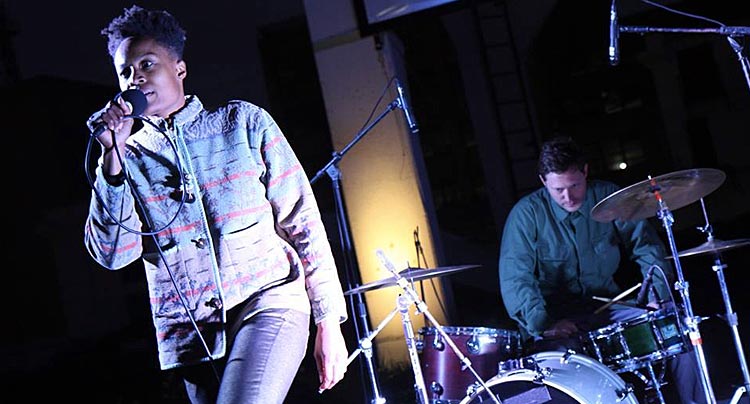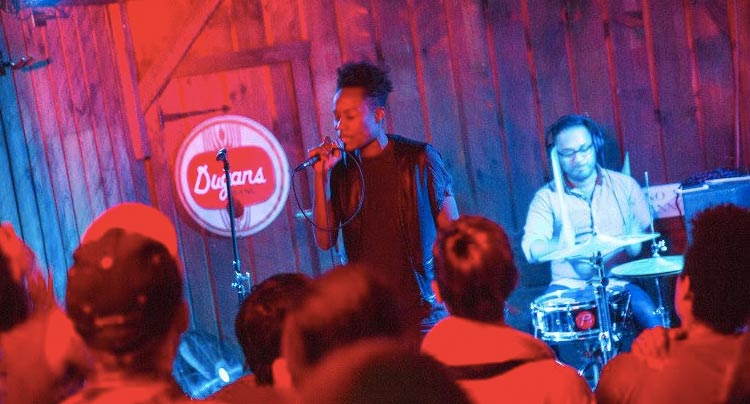Sean Desiree Explains The Origins & Themes of ‘Bell’s Roar EP’

Bell’s Roar began with just a guitar and a voice. Over the years Sean Desiree has transformed her solo project by fully taking advantage of her skills as a drummer, bassist, and ultimately a producer. Her approach to music is DIY not because of its aesthetic, but because of how she keeps her voice ever-present. The music is rooted in a melodic feel, but the beats transform her songs into energetic and dynamic electronic compositions.
Her debut Bell’s Roar EP is a forceful and sensitive collection of six beautiful and personal songs and which was recently mentioned in our Underdog column. Elements of loopy post-rock guitars, hip-hop beats, and R&B vocals combine with an ease and minutia equity suited for the dance floor, living room, or headphones. If the talent Sean Desiree shows on this debut is any indication of what is to come, we will be hearing a lot from her. The vocals, guitar layering and synth-driven beats are best described as synth-pop/post-rock/soul. The album also features Kiran Gandhi, MIA’s drummer for her Matangi tour.
Sean Desiree recently spoke to me about the origins and themes of the EP, develop her own sound, dissecting song meanings, and the key to turning the EP into the final product and much more.
On your Bandcamp, you describe yourself as an instrumentalist. On songs like “Slow” and “Step Up, Step Back”, how many of the instruments are you playing? Which is your favorite to play?
On “Slow” and “Step Up, Step Back” I play mostly everything you hear. I play the guitar, bass, synths, and do backup vocals. The drums on “Step Up, Step Back” are synths. The drums on “Slow” are a mixture of both synths and live drums done by Cedar Apffel, the producer, and myself. There’s a bass synth line in “Slow” and a guitar part in “Cover in Red” and “I Know” that was added in by Cedar. My favorite instruments are guitar and drums.
To me, your music is gorgeous thanks in no small part to how minimal it is. The most obvious elements are the click track, the guitar, and your voice. Is this minimalism intentional, used to convey maximum emotion, or is it just a symptom of your songwriting approach?
It’s just the way I write music. I think because my music started as a singer-songwriter project with just guitar and vocals, those two end up getting highlighted.
Your guitar tone is really incredible. It’s dreamy, emotive, and a tad unsettling, but it’s also restrained and tense, feeling like it could explode forward at any given moment. How do you achieve this – is it a recording technique, guitar pedals, etc.?
I’m in love with the sound of the guitar. I layer harmonies and rhythms on top of each other and seek to find points of harmony and dissonance. A lot of my songwriting takes place in the wee hours and I think that’s conducive to allowing yourself to be emotionally vulnerable. Cedar and I worked together to craft the actual texture of the guitar.
The way you apply guitar in your songs seems like it might be informed by jazz and soul music. What kind of music did you listen to in your formative years? Did this music lead you to pick up the guitar, or did you start with a different instrument and make the transition later?
My early childhood was filled with music of my parents and grandparents’ generation. Motown, jazz, soca, disco and R&B were the most present. I first picked up the guitar to play songs by bands like No Doubt and Nirvana.

Your voice is incredibly flexible, and you have a great sense of command over it. Were you ever formally trained? If not, how did you form your voice into the powerful instrument it is today?
I never really believed in my voice and was incredibly shy about it. I played in another band before this in which I rarely sung. It wasn’t until I started writing music for myself that I began to develop my own sound and confidence. I was never formally trained but would like to do that. I believe my voice has a lot more to offer.
When I listen to your music, I’m reminded only tangentially of other musicians – even though Bell’s Roar is still a relatively new project, you’ve already given it its own unique sound. This makes your influences difficult to pinpoint, but I’m interested in knowing what genres and musicians they are since they’ve resulted in such a specific sound.
I don’t feel like I’m truly influenced by a particular sound. There are bands I like, such as Santigold, Radiohead, Lauryn Hill, etc., but I don’t see myself as them. I feel like my uniqueness comes from years of building my ideas and writing everything myself. There’s not that much outside influence with my project, so it’s a genuine expression of myself. Of course I am influenced by others but it’s not in such a direct way. I am finding it challenging to not fit into a genre because most bookers, music bloggers, etc. want to know how to place you and to make comparisons.
Your name is a tribute to feminist writer bell hooks. How has her writing affected your lyricism? Has she affected how you approach creating music?
My writing to some extent. I read her because she speaks about issues that reflect my core beliefs. She focuses on the intersections of race, capitalism, and gender and how they perpetuate systems of oppression. My lyrics have that theme and I allow myself to speak freely about being queer because I will not let the music industry oppress my self-expression.
It’s clear that Cedar Apffel, who produced your album and has produced many others, did a great job here. How significant was his contribution to the final mood and sound of the album? What exactly did he contribute?
He was key to turning it into the final product. I came to him with demos that I made with Logic Pro and the quality was ok, but not great. All I had at my disposal were Logic amp samples and synth sounds. I was planning on releasing it just as that, but he really loved the music and wanted to re-record everything. So within the course of meeting maybe 8 times I re-recorded all guitar, bass and vocals with him creating the tone. He also added his ideas as far as arrangement. I am greatly appreciative of that because I’m doing this alone and sometimes I’m unsure and need constructive criticism.
Apart from the dreaminess and minimalism in your music, I feel like there’s a good amount of sadness and ache in it. Do you do this to match the mood of your lyrics? Is it a result of the tone, space, and tempo you give your guitar? Is it some of both?
The guitar is usually the basis of my songs and it is where I get the tone. The music sometimes works with the mood of the music and sometimes it has nothing to do with it. “I Know” is an example of music first and lyrics second. The music has a lot of energy and happiness while the lyrics are about abuse. “Slow” is where they work well together. There’s a lot of emotion in both. I think a lot of mainstream music uses the formula of having the two match, but I believe conveying a message while getting people to dance is powerful.

It really does seem like these lyrics are incredibly personal to you. In listening to the EP, I had trouble pinpointing which track is closest to your heart. So I want to ask, which of these songs holds the most meaning for you?
It’s between “Slow”, “I Know” and “Ancestors.” “Slow” is obviously about the love of my life. “I Know” is about my experience with abuse. “Ancestors” is a tribute to the lives of my ancestors. “I Know” may have a bit more meaning because it’s something I don’t talk about publicly but was able to write about.
The new album has extensive use of vocal harmonies. When you’re writing your lyrics, do you ever imagine certain words being sung by more than one layer of voice, or is that a decision you make after crafting the instrumental?
It’s both. Pretty soon after I have the lyrics or melody other sounds come into my head. Cedar and Alisa [Sikelianos-Carter, my partner] also added in ideas.
I think one of the most interesting and universally relatable lyrics comes from “Covered in Red”: “You can’t pay me to be/something that I can’t see/and if you’re like that/you better fight back.” It’s a lyric that could be applied to all sorts of situations in life, and the song’s other lyrics suggest what specifically you’re talking about, but I’d like you to elaborate on it more now, if you can.
The song has two meanings really, or it’s two songs in one. I have the most difficult time with lyrics. I love writing the music and melody for vocals but sometimes I have my partner, Alisa Sikelianos-Carter help me write the lyrics. The song started out being about my tendency to shutdown in relationships. I sometimes have a hard time being vulnerable and will hold back my feelings. I’m trying to overcome that. The lyrics you brought up were from the other version talking about societies brainwashing and oppression. However, they relate because most of my fear of being open comes from my fear of judgement and feeling less than.
Is the title “Covered in Red” implying that you’re covered in blood? To me, none of the lyrics in the song could suggest that, but I want to know if I’ve missed something.
This song was revised a few times and the original version had a chorus with lyrics that talked about being covered in red as being covered in blood. Once the lyrics got removed I never thought of redoing the title. I loved the name and the song just became “Covered in Red” no matter what the lyrics were.
How has your sound changed since Bell’s Roar started? Do you have any sort of future vision for it, or are you just going to take your creativity as it comes to you?
It has expanded from my voice and guitar to a more realized vision of my music. This initial EP gets out the concept of the project, but I believe further development of who I am as a musician will only bring forth more creativity.
In the years that Bell’s Roar has been alive, how often have you played live? Have you toured at all? Do you have any upcoming shows planned?
I have performed live pretty rarely up until this point. I have done 2 short tours, one in the Northwest and the other in Germany. Now that I released my first album I plan on spending a lot of my time booking and performing. I would love to sustain myself off of doing what I love. To get to that point I have to introduce people to my music and hopefully it resonates.
